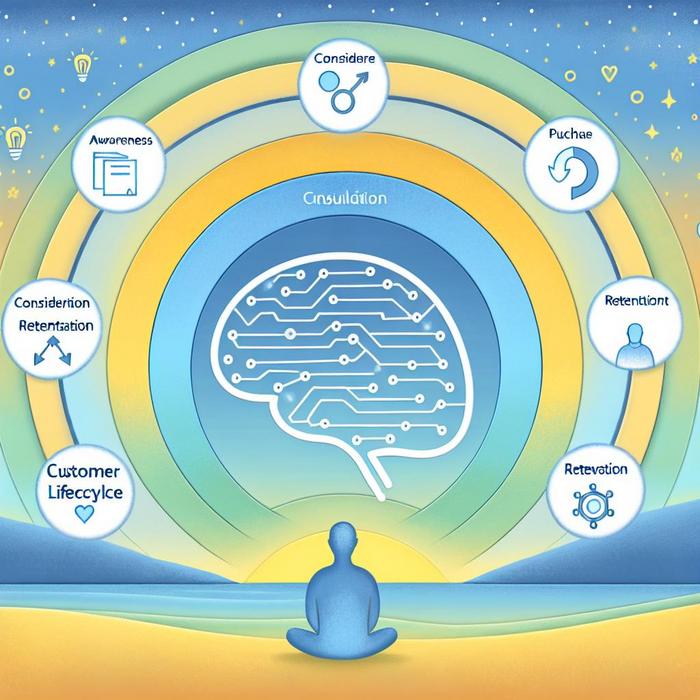Exploring the AI Revolution in Customer Lifecycle Management on Google
As CMOs, CGOs, CFOs, COOs, and CEOs, the quest for innovative strategies and actionable insights that can fuel business growth is constant. Artificial Intelligence (AI) is emerging as a key player in this quest, particularly in the realm of Customer Lifecycle Management (CLM) on Google’s advertising platforms.
AI-Powered Tools: A New Era of Customer Engagement
AI’s capacity to analyze complex data sets, predict consumer behavior, and enhance decision-making is reshaping how businesses engage with their customers in real-time. For instance, Google’s real-time data analysis tool leverages AI to provide real-time insights into customer behaviors and preferences. This capability offers executives opportunities to make prompt strategic decisions, optimizing customer interactions, and ultimately, driving business growth.
For comparison, let’s examine the AI offerings on Google’s main competitor’s platforms. TikTok is also innovating its AI-based features, aiming to simplify ad campaigns and provide better engagement rates. Meta, formerly Facebook, has a stronghold on precise targeting techniques implemented using AI. These strategies are critical for more efficiently allocating resources to high-value customers.
Google Vs. TikTok Vs. Meta: The AI Showdown
While all three platforms are leveraging AI to boost customer engagement and improve ad performance, the question remains: which offers the most valuable application of AI for your business?
Google’s AI integration extends to their search algorithm, Pay-Per-Click (PPC) campaigns, and audience segmentation, providing businesses with deeper, more actionable insights. Such offerings give Google an edge in utilizing AI to inform strategic decision making aimed at enhancing customer interactions.
Meanwhile, TikTok, the new player in the field, offers unique AI-driven features like personalized feeds and smart content discovery that are targeted towards younger audiences.
Meta’s AI capabilities complement its vast and diverse user base. Its advanced targeting options allow businesses to tap into niche audience segments, thereby optimizing ad performance and Return on Ad Spend (ROAS).
Clearly, each platform has its strengths, and the decision will depend on your business objectives, target audience, and market positioning.
Future Implications of AI in Customer Lifecycle Management
The use of AI in managing the customer lifecycle is only set to grow. According to Google Cloud CEO, AI is the future, with immense possibilities for businesses of all sizes. As such, the ability to leverage AI in enhancing CLM will increasingly become a competitive advantage.
As we delve deeper into this era of AI-driven customer management, the opportunity lies in harnessing the power of these technologies to deliver personalized experiences, improve customer loyalty, and drive sustainable growth. The continuous evolution of AI in platforms like Google, Meta, and TikTok offers exciting potential for strategic decision-making and optimized customer engagements.
Stay ahead of the curve by integrating AI into your CLM strategies and enjoy the benefits of data-driven insights, heightened customer engagement, and efficient resource allocation towards high-value customers. It’s a discovery journey that keeps unfurling exciting possibilities.
Remember, your strategic decisions today will shape the future of your business. So, choose wisely, and place your bets on the winning horse in the AI race.
AI in PPC Campaign Management: Delivering Results-driven Ad Strategies
Fuelled by AI, Pay-Per-Click (PPC) campaign management has emerged as an essential strategy to drive business growth. Ad platforms such as Google, TikTok, and Meta are devising newer AI-enabled strategies to harness the potential of PPC campaigns.
Google’s AI, in particular, is revolutionizing PPC campaign management. As mentioned previously, Google’s AI-integrated tools provide real-time customer behavior insights, assisting in making strategic decisions for optimized customer interactions. Google’s advanced bidding tools are fine-tuned to improve PPC campaign results, thereby elevating ad performance and ROAS.
On the other hand, TikTok and Meta have integrated AI in their PPC campaign management to offer businesses unique opportunities for customer engagement. TikTok’s AI features promote a personalized user experience and content discovery, supplying the audience with relevant ads. Meta uses AI to extend its advanced targeting options, offering businesses the chance to reach niche audience segments, which in turn drives high user engagement and ROAS.
In-depth Performance Analysis: Google, Meta, and TikTok
Assessing the performance of these digital platforms from an AI-integration perspective reveals some noteworthy findings.
Google’s range of AI-driven tools has made it the go-to choice for businesses searching for real-time data analysis and actionable insights. Vodafone’s use of Google Cloud AI for network lifecycle management serves as a prime example of how large companies can exploit AI to boost operational efficiency.
In comparison, Meta, with its AI capabilities, excels in terms of precise targeting. A report by Value-Based Platforms elucidates how Metas’ advanced targeting techniques can maximize a business’s ROAS.
TikTok’s strength in AI lies in its content discovery feature, which provides users with a more personalized and interactive experience. The platform’s advanced algorithm effectively recommends content, thereby enhancing the audience’s interaction with the ads.
Why Leaders Need to Care About AI-Powered Marketing
With big tech players like Google, Meta, and TikTok reshaping customer engagement using AI, understanding and effectively leveraging these tools should be a top priority for business leaders. Not only does AI offer the power to drive ROAS, but it also allows companies to deliver a personalized customer experience, building loyalty and driving growth.
With AI’s continued evolution, its impact on CLM will deepen. An example of such progress is given in Evergent’s AI-driven CLM transformation, which exemplifies how AI can deliver a comprehensive, end-to-end approach to digital service transformation.
Leaders must therefore tap into AI-driven strategies to navigate the complexities of CLM, and harness the power of these technologies to deliver personalized experiences, improve customer loyalty, and drive sustainable growth.
Undeniably, AI will continue to revolutionize CLM, with every stride enhancing the customer experience, increasing loyalty, and ultimately, driving business growth. It’s indeed an exhilarating era for businesses to leverage the multitude of possibilities AI continues to provide. After all, the strategic decisions you’re making today are essentially paving the path for your business’s future.
So, as we charge ahead in the AI-driven digital landscape, let’s maximize these tools’ potential, making business growth not just a desired outcome, but a seamless reality. The opportunities are endless, and this AI revolution is just getting started.


